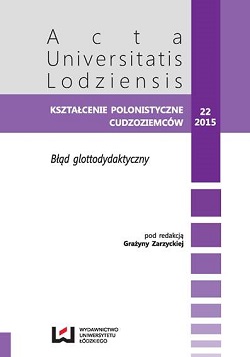Taiwanese English learners’ perceptions of errors in speaking
DOI:
https://doi.org/10.18778/0860-6587.22.08Słowa kluczowe:
Tajwan, kolektywizm, percepcja/postrzeganie, błąd w mówieniu, język angielski jako obcy, niepokój, Taiwan, collectivism, perception, error, speaking, EFL learner, anxietyAbstrakt
The main purpose of this article is to examine the Taiwanese EFL learners’ perceptions of errors in speaking in order to better understand this group of students and reduce the barrier of unnecessary misinterpretations and incorrect judgments of one’s behavior. Non-verbal signs sent by Taiwanese students committing errors can be misleading if one is not familiar with the basic principles underlying this Asian culture, strongly conditioned by collectivism. Often labelled as quiet and shy, Taiwanese language learners actually experience a high level of anxiety, since making an error is seen as a face-threatening act. The author looks closer at the reasons conditioning their attitudes and suggests possible solutions to overcome the problems discussed.Bibliografia
Chan, D.Wu, G. C., 2004, A Study of Foreign Language Anxiety of EFL Elementary School Students in Taipei County, “Journal of National Taipei Teachers College”, Vol. 17, No. 2 (Sep. 2004), pp. 287–320.
Google Scholar
Chern, C. L., 2002, English Language Teaching in Taiwan Today, “Asia–Pacific Journal of Education”, Vol. 22, No. 2 (2002), pp. 97–105.
Google Scholar
DOI: https://doi.org/10.1080/0218879020220209
Chung, I. F., Huang, Y. C., 2009 The Implementation of Communicative Language Teaching: An Investigation of Students’ Viewpoints, The Asia–Pacific Education Researcher, Vol. 18, No. 1.
Google Scholar
DOI: https://doi.org/10.3860/taper.v18i1.1036
Edmondson, W., 1999, Twelve Lectures on Second Language Acquisition: Foreign Language Teaching and Learning Perspectives, Gunter Narr Verlag, Tübingen 1999.
Google Scholar
Hall, B. J., 2004, Among Cultures: The Challenge of Communication, Cengage Learning.
Google Scholar
Hubbs, E., 2013, Taiwan Language–in–Education Policy: Social, Cultural, and Practical Implications, “Arizona Working Papers in SLA & Teaching”, 20, pp. 76–95.
Google Scholar
Kaplan, R., Baldauf, R., 2008, Language Policy and Planning in Chinese Characters, Japan, Nepal, and Taiwan: Some Common Issues, in: Kaplan, R., Baldauf, R., Language Planning and Policy, Asia, Vol. 1 Japan, Nepal, and Taiwan, and Chinese Characters, Multilingual Matters, Bristol, pp. 7–37.
Google Scholar
DOI: https://doi.org/10.2307/jj.27710834.4
Liu, M., 2006, Anxiety in Chinese students at different proficiency levels, “System”, nr 36, pp. 301–316, Elsevier Ltd., doi: 10.1016/j.system.2006.04.004.
Google Scholar
DOI: https://doi.org/10.1016/j.system.2006.04.004
Liu, J., 2001, Asian Students’ Classroom Communication Patterns in U.S. Universities: An Emic Perspective, Greenwood Publishing House.
Google Scholar
DOI: https://doi.org/10.5040/9798400615283
Lu, L. et. al, 2001, Cultural Values and Happiness: An East–West Dialogue, “The Journal of Social Psychology”, Volume 141, Issue 4, pp. 477–493, doi: 10.1080/00224540109600566.
Google Scholar
DOI: https://doi.org/10.1080/00224540109600566
Masiak, Pawłowska (2013) Porównanie nasilenia objawów uzależnienia od telefonu komórkowego u studentów z Polski, Tajwanu i z USA, „Current Problems of Psychiatry”, nr 14(4), pp. 222–226.
Google Scholar
Oxford, R., 2005, Anxiety and the language learner: New insights, in: Arnold, J. (ed.), Affect in language learning, Cambridge Language Teaching Library, CUP, pp. 55–69.
Google Scholar
Sun, Y. F., 2008, Motivation to Speak: Perception and Attitude of Non–English Major Students in Taiwan, ProQuest, Michigan.
Google Scholar
Wu, K. H., Ke, C, (2009) Haunting Native Speakerism? Students’ Perceptions toward Native Speaking English Teachers in Taiwan, “English Language Teaching”, nr 44.
Google Scholar
DOI: https://doi.org/10.5539/elt.v2n3p44
Young, J., 2008, An Investigation of Students’ Perspectives on Anxiety and Speaking, “Foreign Language Annals”, Volume 23, Issue 6, pages 539–553, doi: 10.1111/j.1944-9720.1990.tb00424.x.
Google Scholar
DOI: https://doi.org/10.1111/j.1944-9720.1990.tb00424.x
Zimbardo, P., 2007, Nieśmiałość: co to jest i jak sobie z nią radzić, Warszawa, PWN.
Google Scholar
Pobrania
Opublikowane
Jak cytować
Numer
Dział
Licencja

Utwór dostępny jest na licencji Creative Commons Uznanie autorstwa – Użycie niekomercyjne – Bez utworów zależnych 4.0 Międzynarodowe.










